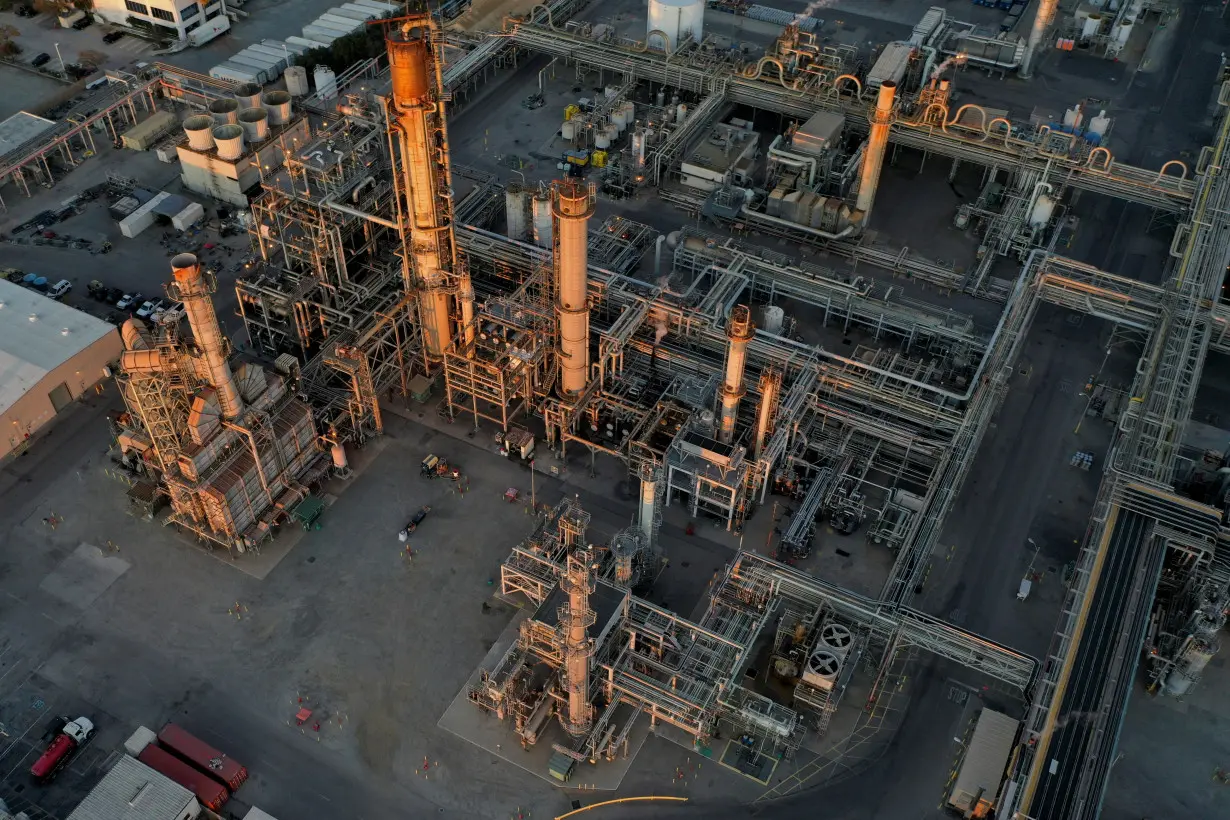(Reuters) - Activist investor Elliott Investment Management revealed a $1 billion stake in U.S. refiner Phillips 66 on Wednesday, calling for a boardroom overhaul and criticizing management for taking its "eye off the ball" on refining assets.
Phillips 66 is the third-largest independent U.S. refiner, owning eight refining complexes across the country. Two other U.S. refineries, Wood River and Borger, are owned by a 50% joint venture between Phillips 66 and Canada's Cenovus Energy.
Below are details of all refineries owned or operated by Phillips 66:
U.S. REFINERIES:
WOOD RIVER, Roxana, Illinois, refining capacity: 356,000 barrels per day (bpd)
Largest Phillips 66 refinery by operating capacity. Produces gasoline, diesel, aviation fuel, petrochemical feedstocks, asphalt and fuel-grade petroleum coke. Built in 1917 and spread across about 2,200 acres, the refinery is a key supplier of fuel to the U.S. Midcontinent region.
BORGER, Borger, Texas, capacity: 149,000 bpd
Produces transportation fuels, petrochemical coke and sulfur, natural gas liquids, and solvents. Built in 1926, the refinery distributes products in West Texas, New Mexico, Colorado and the Midcontinent region.
SWEENY, Old Ocean, Texas, capacity: 265,000 bpd
Mainly produces transportation fuels. Also produces petrochemical feedstocks, home heating oil and fuel-grade petroleum coke. Purchased by Phillips 66 in 1947. Products are supplied to the Midcontinent region, southeastern and eastern United States. Exports from this refinery primarily go to Latin America.
LAKE CHARLES, Westlake, Louisiana, capacity: 264,000 bpd
Produces transportation fuels, off-road diesel, home heating oil and feedstocks for lubricants. Products are supplied domestically in the southeastern and eastern United States and exported to Latin America and Europe.
BAYWAY, Linden, New Jersey, capacity: 258,500 bpd
Located on the New York Harbor, Bayway produces transportation fuels, residual fuel oil, home heating oil and petrochemical feedstocks. Refined products are distributed across the East Coast.
PONCA CITY, Ponca City, Oklahoma, capacity: 208,000 bpd
Built in 1918, the refinery produces transportation fuels and petroleum coke which are distributed mainly in the Midcontinent region.
LOS ANGELES: Carson and Wilmington, California, capacity: 139,000 bpd
Two sites linked by pipeline, producing California Air Resources Board-grade gasoline and fuel-grade petroleum coke. Supplies fuel in California, Nevada and Arizona.
FERNDALE, Ferndale, Washington: 105,000 bpd
Produces transportation fuels and small amounts of residual fuel oil for customers in the northwest U.S.
BILLINGS, Billings, Montana, capacity: 66,000 bpd
Produces transportation fuels that are distributed to customers in Montana, Wyoming, Idaho, Utah, Colorado and Washington. Also produces fuel-grade petroleum coke.
*SAN FRANCISCO: Santa Maria, Wilmington, California and Rodeo, Rodeo, California, capacity: 120,200 bpd
Phillips 66's San Francisco operations consisted of two sites: Santa Maria refinery in Wilmington, California and Rodeo refinery in Rodeo, California. Santa Maria was shut in February as part of Phillips 66's plans to convert the complex to renewable diesel production.
INTERNATIONAL REFINERIES:
HUMBER, North Lincolnshire, United Kingdom, total throughput: 245,000 bpd
Produces transportation fuels, petrochemical feedstocks, home heating oil and petroleum coke. Light oils are distributed mainly in the UK while other products are exported.
MiRO, Karlsruhe, Germany, total throughput: 61,000 bpd
Produces transportation fuels, petrochemical feedstocks, home heating oil, bitumen, and petroleum coke. Supplies fuel in Germany, Switzerland, France and Austria.
*Note: San Francisco, and other capacity data, is based on data as of Jan. 1, 2023, prior to the Santa Maria closure. Converted Rodeo refinery is expected to produce over 50,000 bpd of renewable transportation fuels upon completion in 2024.
Sources: Company filings, U.S. Energy Information Administration
(Reporting by Shariq Khan in Bengaluru; Editing by Matthew Lewis)

 German economy, Europe’s largest, shrinks for second straight year
German economy, Europe’s largest, shrinks for second straight year
 Supreme Court will hear Texas anti-pornography law that challengers say violates free-speech rights
Supreme Court will hear Texas anti-pornography law that challengers say violates free-speech rights
 Yellen defends COVID spending, says it saved millions from losing jobs
Yellen defends COVID spending, says it saved millions from losing jobs
 Comoros ruling party wins parliamentary elections, opposition rejects results
Comoros ruling party wins parliamentary elections, opposition rejects results
 Sweden seeks to change constitution to be able to revoke citizenships
Sweden seeks to change constitution to be able to revoke citizenships
 US inflation likely remained elevated last month, threatening interest rate cuts
US inflation likely remained elevated last month, threatening interest rate cuts
 Coors Light is changing its name
Coors Light is changing its name
 Tiger Woods’ son Charlie chuckles while watching his dad suffer heavy defeat in TGL debut
Tiger Woods’ son Charlie chuckles while watching his dad suffer heavy defeat in TGL debut
 Bayern Munich signs US youngster Bajung Darboe from LAFC
Bayern Munich signs US youngster Bajung Darboe from LAFC








